agree的相关用法
agree的用法及解释

agree的用法及解释对于agree的用法,常常被很多人忽略,其实对初学者来说,agree是一个常见的词汇,它的用法有很多,那么你了解多少呢?下面是小编给大家带来的agree的用法及解释_agree的六个用法总结,以供大家参考,我们一起来看看吧!agree的解释v. 同意; 赞成; (对…) 取得一致意见,一致同意; 应允; 答应;[例句]If we agreed all the time it would be a bit boring, wouldn't it?如果我们总是意见一致,就会有点无趣,对吗?[其他] 第三人称单数:agrees 现在分词:agreeing 过去式:agreed 过去分词:agreedagree to,agree with,agree on,agree about的用法区别.1.agree (to sth) 意为“同意;愿意;答应(某事物)”.如:Is he going to agree to our suggestion?他会同意我们的建议吗?2.agree with sb 意为“适合(某人的健康或胃口)”,尤用于否定句或疑问句中.如:The climate there doesn\'t agree with him.那里的气候对他不合适.3.agree (with sb) (about / on sth) 意为“同意;(与某人)意见一致”.如:We couldn\'t agree on a date/ when to meet.关于日期(什么时候见面),我们没有能取得一致意见.4.agree sth意为“在某事物上取得一致意见;商定”.如:Can we agree a price?我们能不能商定一个价格?5.agree (with sth) 意为“与(某事物)相一致;相符合;相吻合”.如:Your thoughts didn\'t agree with mine.你的想法和我的想法不一致.6.be agreed(on /about sth)意为“达成协议;意见一致”.如:We are all agreed on the best action.我们都同意这一最佳措施.7.agree后面还可以接宾语从句,即be agreed that ...如:It was agreed that another meeting was necessary.大家都认为有必要再开一次会.agree的六个用法agree一般与with连用,agree with sb.,表示同意某人的观点agree vt. & vi. 基本用法如下1)单独使用,表示同意、答应等。
agree的用法和固定搭配
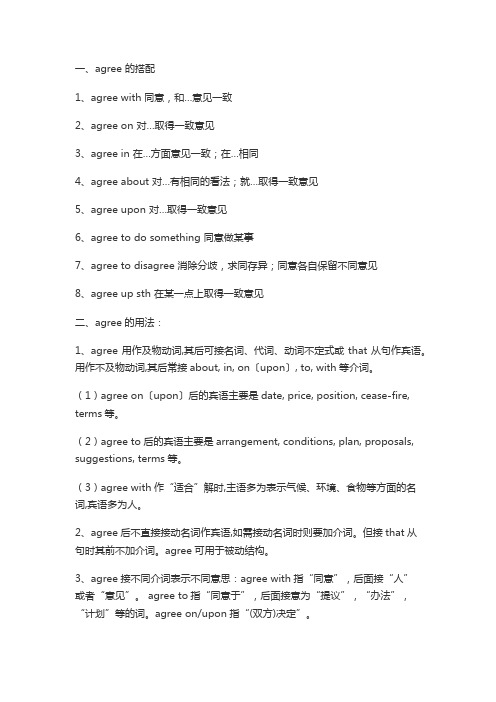
一、agree 的搭配1、agree with 同意,和…意见一致2、agree on 对…取得一致意见3、agree in 在…方面意见一致;在…相同4、agree about 对…有相同的看法;就…取得一致意见5、agree upon 对…取得一致意见6、agree to do something 同意做某事7、agree to disagree 消除分歧,求同存异;同意各自保留不同意见8、agree up sth 在某一点上取得一致意见二、agree的用法:1、agree用作及物动词,其后可接名词、代词、动词不定式或that从句作宾语。
用作不及物动词,其后常接about, in, on〔upon〕, to, with等介词。
(1)agree on〔upon〕后的宾语主要是date, price, position, cease-fire, terms等。
(2)agree to后的宾语主要是arrangement, conditions, plan, proposals, suggestions, terms等。
(3)agree with作“适合”解时,主语多为表示气候、环境、食物等方面的名词,宾语多为人。
2、agree后不直接接动名词作宾语,如需接动名词时则要加介词。
但接that从句时其前不加介词。
agree可用于被动结构。
3、agree接不同介词表示不同意思:agree with指“同意”,后面接“人”或者“意见”。
agree to指“同意于”,后面接意为“提议”,“办法”,“计划”等的词。
agree on/upon指“(双方)决定”。
4、agreed指“互相同意的”,作为不及物动词的过去分词时,可作形容词,后可接that从句。
5、agree也可作为及物动词的过去分词。
agreed to do表示“在别人建议下同意做某事”,而agreed in doing表示“彼此间相互同意做某事”;。
agree的用法和例句

agree的⽤法1:agree的基本含义是“同意”。
指某⼀⽅同意另⼀⽅的观点、看法或对另⼀⽅提出的计划、建议、条件等表⽰同意; 也指双⽅或多⽅就某事经协商取得⼀致意见或对某事看法⼀致。
agree所表⽰的“同意”,多指经讨论、谈判或劝说使原有的分歧或相反意见得以解决⽽取得⼀致意见。
引申可表⽰事物的“相⼀致”“相符合”和⼈际关系的“相适应”“相融洽”。
agree的⽤法2:agree⽤作及物动词,其后可接名词、代词、动词不定式或that从句作宾语。
⽤作不及物动词,其后常接about, in, on〔upon〕, to, with等介词。
agree on〔upon〕后的宾语主要是date, price, position, cease-fire, terms等。
agree to 后的宾语主要是arrangement, conditions, plan, proposals, suggestions, terms等。
agree with作“适合”解时,主语多为表⽰⽓候、环境、⾷物等⽅⾯的名词,宾语多为⼈。
agree的⽤法3:agree后不直接接动名词作宾语,如需接动名词时则要加介词。
但接that从句时其前不加介词。
agree可⽤于被动结构。
agree的⽤法4:agree以往主要⽤作不及物动词,作及物动词的⽤法是严格限制在会计⽤语中的。
例如:The inspector of taxes has now agreed your claim for expenses.税务稽查员已同意你提出的费⽤要求。
Do you agree the bill?你同意这张单据吗? agree的⽤法5:对句型 agree to do sth,有⼈说是agree加动词不定式; 有⼈说是agree to+动词原形; 也有⼈说是agreeto+动词不定式,两个to合⼆为⼀。
agree的⽤法6:句型to be agreed...有的是被动结构,有的是系表结构,要注意分辨。
Agree的用法

Agree的用法agree后面接介词法比较复杂,常见用法有:(1) 涉及讨论的题目用about。
They never agree about politics. 关于政治问题,他们总是意见不一致。
(2)要确定一样事情用on。
Can we agree on a date for the next meeting? 我们能不能为下次会议确定一个时间?(3)涉及一件建议或计划用to。
He’s agreed to our suggestion about the holiday. 他已经同意我们关于假日的计划了。
(4)涉及意思、想法、分析、解释以及涉及人的时候用with。
They might not agree with his opinions. 他们可能不同意他的意见。
(5)agree后可接动词不定式或宾语从句。
We agree to leave at once. 我们同意马上离开。
agree一般常用口语用法(1)I can't argue with you about that. 我无法与您争辩那件事。
(2)Y ou can say that again. 您说的对极了。
(3)You took the words right out of my mouth. 您已说出我心里的话。
(4)I was about to say the same thing. 我正想提出同样看法。
(5)I couldn't agree with you more. 我极表同意您的看法。
注意上列类似用语"I couldn't agree with you more.",按字面翻译为「我无法再更加同意您了」,实则表「我对您极表同意」。
注意这是固定句型,助动词必须用couldn't,而不可用can't。
Each与every都有“每个”的意思,但二者含义及语法功能不同,主要区别是:一、1. ea ch既可用作形容词,又可用作代词,在句中可以作定语,主语、宾语、同位语、状语等。
agree的英语用法

agree的英语用法Agree的用法agree后面接介词法比较复杂,常见用法有:(1) 涉及讨论的题目用about.They never agree about politics.关于政治问题,他们总是意见不一致.(2)要确定一样事情用on.Can we agree on a date for the next meeting?我们能不能为下次会议确定一个时间?(3)涉及一件建议或计划用to.He’s agreed to our suggestion about the holiday.他已经同意我们关于假日的计划了.(4)涉及意思、想法、分析、解释以及涉及人的时候用with.They might not agree with his opinions.他们可能不同意他的意见.(5)agree后可接动词不定式或宾语从句.We agree to leave at once.我们同意马上离开.agree一般常用口语用法(1)I can't argue with you about that.我无法与您争辩那件事.(2)You can say that again.您说的对极了.(3)You took the words right out of my mouth.您已说出我心里的话.(4)I was about to say the same thing.我正想提出同样看法.(5)I couldn't agree with you more.我极表同意您的看法.注意上列类似用语"I couldn't agree with you more.",按字面翻译为「我无法再更加同意您了」,实则表「我对您极表同意」.注意这是固定句型,助动词必须用couldn't,而不可用can't.。
agree的用法英语语法:agree的用法

agree的用法英语语法:agree的用法1.agreewith①表示同意某人或某人的意见、想法、分析、解释等(即持同一观点):Idon’tagreewithyou.我不同意你的意见。
Theyagreedwiththisidea.他们同意这个想法。
Iagreewithwhatyousay.我同意你说的。
②表示“(食物、天气、工作等)对…适宜”:Theweatherdoesnotagreewithme.这种天气对我不适宜。
Hardworkdoesnotagreewithhim.艰苦的工作对他不适宜。
③表示“与…一致”:Averbmustagreewithitssubjectinpersonandnumber.动词必须和它的主语在人称和数方面保持一致。
Whathedoesdoesnotagreewithwhathesays.他言行不一致。
2.agreeto①主要用来表示一方提出一项建议、安排、计划等,另一方同意协作:Weagreedtotheirarrangement.我们同意了他们的安排。
Sheagreedtomarriage.她同意结婚。
有时agreeto也可用来表示“答应”一件自己不愿做的事:Iwasforcedtoagreetoit,butath eartIdidn’tquiteagreewithit.我被迫答应,但内心并不完全同意。
②后接suggestion,plan,proposal等名词时,与accept同义:Doyouthinkhewillagreeto(=accept)mysuggestion?你认为他会同意(接受)我的建议吗?③其后既可接动词原形(此时to是不定式符号),也可接动名词(一般有逻辑主语,此时to是介词):Heagreedtogowithus.他同意同我们去。
IneveragreedtoMarymarryinghim.我从来没同意玛丽嫁给他。
3.agreeon[upon]①主要指双方通过协商而取得一致意见或达成协议:Weagreedontheprice.我们就价格达成了一致意见。
Agree的用法

I.Agree的用法agree后面接介词法比较复杂,常见用法有:(1) 涉及讨论的题目用about。
They never agree about politics. 关于政治问题,他们总是意见不一致。
(2)要确定一样事情用on。
(协调一致)Can we agree on a date for the next meeting? 我们能不能为下次会议确定一个时间?(3)涉及一件建议或计划用to。
(并非处于主观愿望的同意,尤指不乐意或争论后同意)He’s agreed to our su ggestion about the holiday. 他已经同意我们关于假日的计划了。
(4)涉及意思、想法、分析、解释以及涉及人的时候用with。
(主观愿意的赞同,但不含协力合作之意)(也可作“适合于…..协调一致”)They might not agree with his opinions. 他们可能不同意他的意见。
(5)agree后可接动词不定式或宾语从句。
We agree to leave at once. 我们同意马上离开。
(6)I couldn't agree with you more. (注意助动词必须用couldn't,而不可用can't)我极表同意您的看法。
II.be sure的用法对be sure的用法常感困惑不解,现将其主要用法归纳如下。
1.be sure+of/about+动名词或名词,意为“确信……”;“对……有把握”。
但在接名词时,be sure of侧重指主语对某抽象事物的确信无疑;而be sure about则侧重指主语对某具体事物的确信无疑。
例如:He is sure of success.他自信会成功的。
If you are not sure about the situation in the world,you can read the newspaper every day.如果你对世界形势不大了解,你可以每天看看报纸。
agree做及物动词用法

agree做及物动词用法
agree作为及物动词的用法如下:
1.表示同意对方的意见、看法、观点时,可用agree with sb,此时谓语动词用单数形式。
例句:I agree with you regarding the proposed changes.
关于所提出的修改意见,我同意你的看法。
2.表示“(食物、天气、健康状况)适宜”时,可用agree with sb/sth,此时谓语动词用单数形式。
例句:I think the wine will agree with your constitutions.
我想这种酒合你的口味。
3.表示“在看法、判断、分析方面取得一致意见或达成协议”时,常用agree on sth或agree to sth。
例句:The teaching assistants all agree on the need to limit the size of the class.
辅导教师们就限制班级规模的必要性达成了一致意见。
4.表示“签订协议”时,常用agree to do sth。
例句:We must try to agree to the new plans.
我们必须设法同意那些新计划。
agree的用法和固定搭配
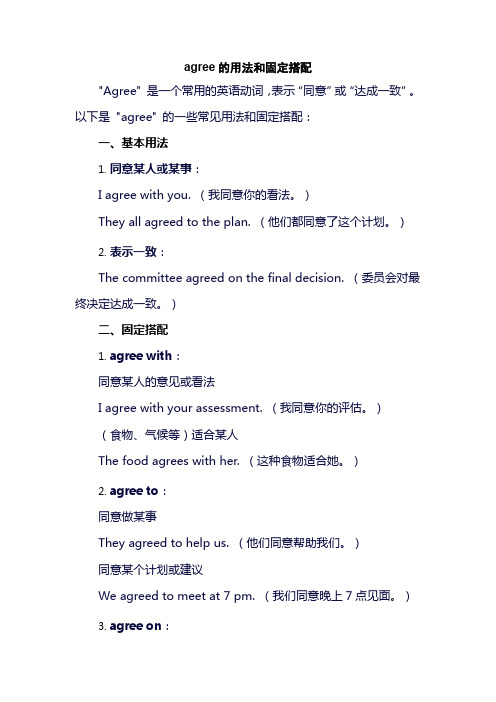
agree的用法和固定搭配"Agree" 是一个常用的英语动词,表示“同意”或“达成一致”。
以下是"agree" 的一些常见用法和固定搭配:一、基本用法1.同意某人或某事:I agree with you. (我同意你的看法。
)They all agreed to the plan. (他们都同意了这个计划。
)2.表示一致:The committee agreed on the final decision. (委员会对最终决定达成一致。
)二、固定搭配1.agree with:同意某人的意见或看法I agree with your assessment. (我同意你的评估。
)(食物、气候等)适合某人The food agrees with her. (这种食物适合她。
)2.agree to:同意做某事They agreed to help us. (他们同意帮助我们。
)同意某个计划或建议We agreed to meet at 7 pm. (我们同意晚上7点见面。
)3.agree on:就某事达成一致意见We finally agreed on the date. (我们最终确定了日期。
)4.agree that:同意某个事实或陈述I agree that it was a mistake. (我同意那是个错误。
)三、其他用法1.表示不同意:可以使用"disagree" 或"not agree" 表示不同意。
I disagree with you. (我不同意你的看法。
)They didn't agree to the proposal. (他们没有同意这个提案。
)2.作为形容词:"agreeable" 表示“令人愉快的”或“适宜的”。
She has an agreeable personality. (她个性随和。
agree的搭配用法总结

agree的搭配用法总结1)agree with + sb/ sth …同意某人/某人意见或某事适合某人I quite agree with you我完全同意你的意见We agree with what you said.我们同意你的说法.Hard work doesn’t agree with him .艰苦的工作对他不适合.2)agree (to) sth 同意/接受别人的计划/安排… (to能够省略) He agreed (to) the plan / the date/ our arrangement. . 3)agree on/ upon … 双方协商达成一致…Can we agree on a right price/date ?4)agree to do sth =agree doing sth disagree to do sthagree sb to do sth 没有此句型5)agreement disagreementhave disagreements in … 在某方面有分歧agree相关例句:1. The dampness of the forest did not agree with him physically. 他的身体不能适合森林的潮湿。
2. It remains to be seen whether her parliamentary colleagues will agree. 她的国会同僚是否同意,现在还无从知晓。
3. I think you'd agree he's a very respected columnist. 我想你得承认他是个备受尊敬的专栏作家。
4. You and I are going to have to agree to disagree then. 那你我只能各自保留不同意见了。
5. They had little choice but to agree to what he suggested. 他们别无选择,只好接受他的提议。
Agree的用法
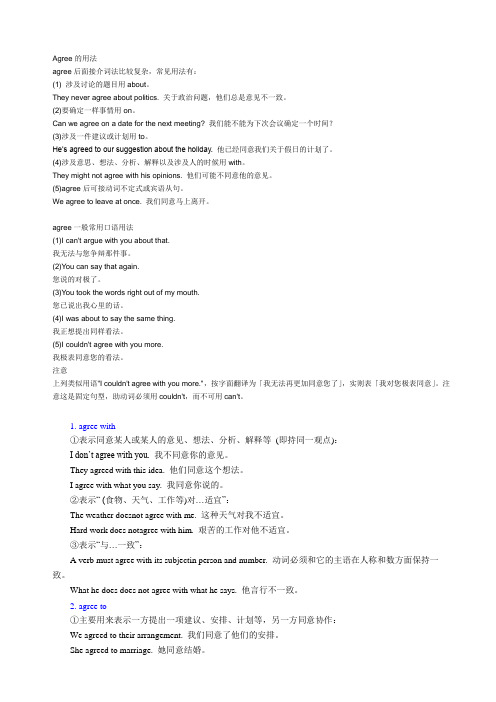
Agree的用法agree后面接介词法比较复杂,常见用法有:(1) 涉及讨论的题目用about。
They never agree about politics. 关于政治问题,他们总是意见不一致。
(2)要确定一样事情用on。
Can we agree on a date for the next meeting? 我们能不能为下次会议确定一个时间?(3)涉及一件建议或计划用to。
He’s agreed to our suggestion about the holiday. 他已经同意我们关于假日的计划了。
(4)涉及意思、想法、分析、解释以及涉及人的时候用with。
They might not agree with his opinions. 他们可能不同意他的意见。
(5)agree后可接动词不定式或宾语从句。
We agree to leave at once. 我们同意马上离开。
agree一般常用口语用法(1)I can't argue with you about that.我无法与您争辩那件事。
(2)You can say that again.您说的对极了。
(3)You took the words right out of my mouth.您已说出我心里的话。
(4)I was about to say the same thing.我正想提出同样看法。
(5)I couldn't agree with you more.我极表同意您的看法。
注意上列类似用语"I couldn't agree with you more.",按字面翻译为「我无法再更加同意您了」,实则表「我对您极表同意」。
注意这是固定句型,助动词必须用couldn't,而不可用can't。
1. agree with①表示同意某人或某人的意见、想法、分析、解释等(即持同一观点):I don’t agree with you. 我不同意你的意见。
短语词汇agree的用法

短语词汇agree的用法短语词汇agree的用法,快来一起学习吧。
下面就和大家分享,来欣赏一下吧。
短语词汇agree的用法1. agree with(1) 表示同意某人或某人的意见、想法、分析、解释等(即持同一观点)。
如:I quite agree with you. 我完全同意你的意见。
We agree with what you say. 我们同意你说的。
(2) 表示“(食物、天气、工作等)对……适宜”。
如:The food does not agree with me. 这食物对我不适合。
Hard work does not agree with him. 艰苦的工作对他不适宜。
(3) 表示“与……一致”。
如:His story agrees with the facts. 他的陈述与事实相符。
A verb must agree with its subject in person and number. 动词必须和它的主语在人称和数方面保持一致。
2. agree to(1) 后接某些名词,表示同意或接受某事,尤其指别人提出的某事,有时可能是自己不喜欢的事。
He agree the plan (the date)。
他同意了这个计划(日期)。
We agreed to their arrangement. 我们同意了他们的安排。
I was forced to agree to it,but at heart I didn’t quite agree with it. 我.应,但内心并不完全同意。
(2) 后接动词原形(此时to是不定式符号)或动名词(一般有逻辑主语,此时to 是介词)。
如:We agreed to leave early. 我们同意早点出发。
She agreed to my going home. 她同意我回去。
注:英语不说agree sb to do sth.如不说:.She agreed me to go home.3. agree on [upon](1) 主要指双方通过协商而取得一致意见或达成协议。
Agree的用法

Agree的用法agree后面接介词法比较复杂,常见用法有:(1) 涉及讨论的题目用about。
They never agree about politics. 关于政治问题,他们总是意见不一致。
(2)要确定一样事情用on。
Can we agree on a date for the next meeting? 我们能不能为下次会议确定一个时间?(3)涉及一件建议或计划用to。
He’s agreed to our suggestion about the holiday. 他已经同意我们关于假日的计划了。
(4)涉及意思、想法、分析、解释以及涉及人的时候用with。
They might not agree with his opinions. 他们可能不同意他的意见。
(5)agree后可接动词不定式或宾语从句。
We agree to leave at once. 我们同意马上离开。
agree with, agree to, agree on(1) ①agree with 的意思是“同意”,“赞成”。
后面常接表示人或意见(看法)的名词或代词作宾语。
Does she agree with us? 她同意我们的意见吗?②agree with 还有“与……一致”,“(气候、食物等)适合”的意思。
His words do not agree with his actions.他言行不一致。
Too much meat doesn't agree with her.吃太多肉食对她身体不合适。
[注意]agree with不能用于被动语态。
(2) agree to 意为“同意”,“赞成”,后面跟表示“提议”,“办法”,“计划”,“安排”等的名词或代词。
Please agree to this arrangement.请同意这个安排。
(3) agree on 表示“对……取得一致意见”,指两方或多方就某个问题取得了一致的意见或是达成了某种协议。
agree用法
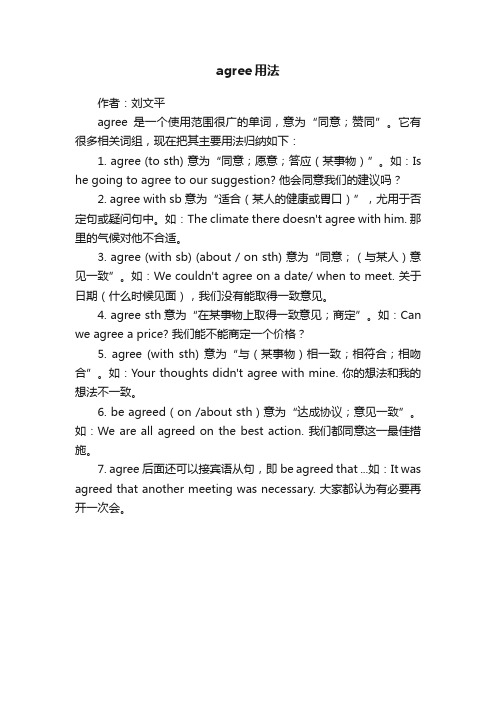
agree用法作者:刘文平agree是一个使用范围很广的单词,意为“同意;赞同”。
它有很多相关词组,现在把其主要用法归纳如下:1. agree (to sth) 意为“同意;愿意;答应(某事物)”。
如:Is he going to agree to our suggestion? 他会同意我们的建议吗?2. agree with sb 意为“适合(某人的健康或胃口)”,尤用于否定句或疑问句中。
如:The climate there doesn't agree with him. 那里的气候对他不合适。
3. agree (with sb) (about / on sth) 意为“同意;(与某人)意见一致”。
如:We couldn't agree on a date/ when to meet. 关于日期(什么时候见面),我们没有能取得一致意见。
4. agree sth意为“在某事物上取得一致意见;商定”。
如:Can we agree a price? 我们能不能商定一个价格?5. agree (with sth) 意为“与(某事物)相一致;相符合;相吻合”。
如:Your thoughts didn't agree with mine. 你的想法和我的想法不一致。
6. be agreed(on /about sth)意为“达成协议;意见一致”。
如:We are all agreed on the best action. 我们都同意这一最佳措施。
7. agree后面还可以接宾语从句,即be agreed that ...如:It was agreed that another meeting was necessary. 大家都认为有必要再开一次会。
Agree的用法

Agree的用法agree后面接介词法比较复杂,常见用法有:(1) 涉及讨论的题目用about。
They never agree about politics. 关于政治问题,他们总是意见不一致。
(2)要确定一样事情用on。
Can we agree on a date for the next meeting? 我们能不能为下次会议确定一个时间?(3)涉及一件建议或计划用to。
He’s agreed to our suggestion about the holiday. 他已经同意我们关于假日的计划了。
(4)涉及意思、想法、分析、解释以及涉及人的时候用with。
They might not agree with his opinions. 他们可能不同意他的意见。
(5)agree后可接动词不定式或宾语从句。
We agree to leave at once. 我们同意马上离开。
agree一般常用口语用法(1)I can't argue with you about that.我无法与您争辩那件事。
(2)You can say that again.您说的对极了。
(3)You took the words right out of my mouth.您已说出我心里的话。
(4)I was about to say the same thing.我正想提出同样看法。
(5)I couldn't agree with you more.我极表同意您的看法。
注意上列类似用语"I couldn't agree with you more.",按字面翻译为「我无法再更加同意您了」,实则表「我对您极表同意」。
注意这是固定句型,助动词必须用couldn't,而不可用can't。
1. agree with①表示同意某人或某人的意见、想法、分析、解释等(即持同一观点):I don’t agree with you. 我不同意你的意见。
Agree的用法

Agree的用法agree后面接介词法比较复杂,常见用法有:(1) 涉及讨论的题目用about。
They never agree about politics. 关于政治问题,他们总是意见不一致。
(2)要确定一样事情用on。
Can we agree on a date for the next meeting? 我们能不能为下次会议确定一个时间?(3)涉及一件建议或计划用to。
He’s agreed to our suggestion about the holiday. 他已经同意我们关于假日的计划了。
(4)涉及意思、想法、分析、解释以及涉及人的时候用with。
They might not agree with his opinions. 他们可能不同意他的意见。
(5)agree后可接动词不定式或宾语从句。
We agree to leave at once. 我们同意马上离开。
agree一般常用口语用法(1)I can't argue with you about that.我无法与您争辩那件事。
(2)You can say that again.您说的对极了。
(3)You took the words right out of my mouth.您已说出我心里的话。
(4)I was about to say the same thing.我正想提出同样看法。
(5)I couldn't agree with you more.我极表同意您的看法。
注意上列类似用语"I couldn't agree with you more.",按字面翻译为「我无法再更加同意您了」,实则表「我对您极表同意」。
注意这是固定句型,助动词必须用couldn't,而不可用can't。
1. agree with①表示同意某人或某人的意见、想法、分析、解释等(即持同一观点):I don’t agree with you. 我不同意你的意见。
agree的用法总结
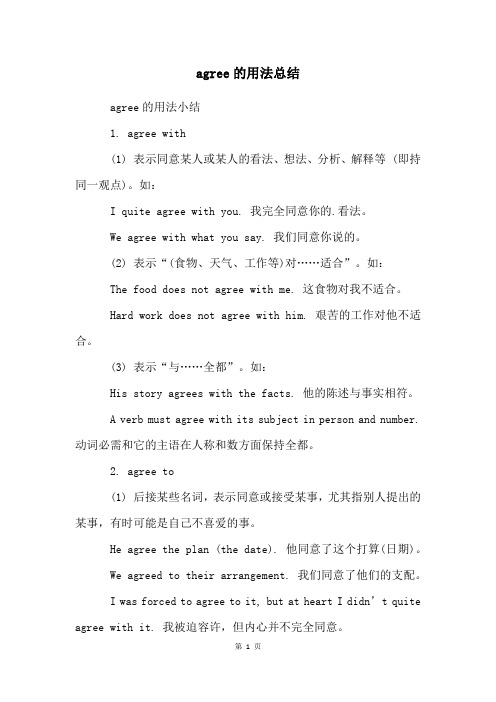
agree的用法总结agree的用法小结1. agree with(1) 表示同意某人或某人的看法、想法、分析、解释等 (即持同一观点)。
如:I quite agree with you. 我完全同意你的.看法。
We agree with what you say. 我们同意你说的。
(2) 表示“(食物、天气、工作等)对……适合”。
如:The food does not agree with me. 这食物对我不适合。
Hard work does not agree with him. 艰苦的工作对他不适合。
(3) 表示“与……全都”。
如:His story agrees with the facts. 他的陈述与事实相符。
A verb must agree with its subject in person and number. 动词必需和它的主语在人称和数方面保持全都。
2. agree to(1) 后接某些名词,表示同意或接受某事,尤其指别人提出的某事,有时可能是自己不喜爱的事。
He agree the plan (the date). 他同意了这个打算(日期)。
We agreed to their arrangement. 我们同意了他们的支配。
I was forced to agree to it, but at heart I didn’t quite agree with it. 我被迫容许,但内心并不完全同意。
(2) 后接动词原形(此时to是不定式符号)或动名词(一般有规律主语,此时 to 是介词)。
如:We agreed to leave early. 我们同意早点动身。
She agreed to my going home. 她同意我回去。
注:英语不说 agree sb to do sth。
如不说:* She agreed me to go home.3. agree on [upon](1) 主要指双方通过协商而取得全都看法或达成协议。
agree短语

agree短语
agree to 同意
agree on 一致同意
agree upon 达成共识
agree about 同意关于...的看法
agree with 同意,赞同,认同
agree短语一直都很常用,它表示同意,赞同,两个或多个人在想法和观点上取得一
致意见。
同时它也可以用在义务、权利方面来表示一致同意。
下面我们通过例句来更好的
理解agree的不同用法:
“Agree to”:agree to表示同意,这个词的主要用法是描述一个人对一个请求或要求做出肯定的回应或允许。
例句:The government has agreed to reduce taxes.政府同意减税。
“Agree on”: agree on表示一致同意,指在一个请求、计划或主意上得到某人的同一反应。
例句:We agree on the plan.我们对这个计划达成一致。
例句:It was difficult, but they agreed upon a solution eventually.这很难,但最终他们达到了共识。
“Agree with”: agree with表示同意,赞同,认同,指一个人表达出与他人一致的感受或看法。
例句:I agree with you that we should work together.我同意你的看法,我们应
该一起工作。
- 1、下载文档前请自行甄别文档内容的完整性,平台不提供额外的编辑、内容补充、找答案等附加服务。
- 2、"仅部分预览"的文档,不可在线预览部分如存在完整性等问题,可反馈申请退款(可完整预览的文档不适用该条件!)。
- 3、如文档侵犯您的权益,请联系客服反馈,我们会尽快为您处理(人工客服工作时间:9:00-18:30)。
agree的相关用法
1.根据句子意思填入恰当的介词。
I’m afraid I could not agree ______ you.
参考答案:with
“(与某人)意见一致”用agree with,故该空应填with。
2. After a discussion, the two sides finally ______ each other.
A. agreed at
B. agreed on
C. agreed with
D. agreed to
参考答案:C
根据句意“经过讨论,双方终于同意对方”,“(与某人)意见一致”用agree with,故正确答案为C。
3. 选择适当的单词填空。
The food does not agree ______ me. (with/to)
参考答案:with
表示“(食物、天气、工作等)对……适宜”用agree with,故该空应填with。
4. We ______ the old people do some housework on weekends.
A. agree to help
B. agree to helping
C. agree help
D. agree to
参考答案:A
根据句意“我们同意去帮助老家人周末做一些家务”,“同意去做某事”用agree to do sth.,故正确答案为A。
5. 用括号中所给单词的适当形式完成句子。
We agreed ______ early. (leave)
参考答案:to leave
“同意去做某事”用agree to do sth.,故该空应填to leave。
6. I ______ with him.
A. agreed to go hiking
B. agreed to going hiking
C. agreed to going to hike
D. agreed to go to hike
参考答案:A
“同意去做某事”用agree to do sth.,“徒步旅行”用go hiking,故正确答案为A。
7. 用括号中所给单词的适当形式完成句子。
The two countries signed a cultural ______ . (agree)
参考答案:agreement
cultural是形容词,后面修饰名词,agree的名词是agreement,故该空应填agreement。
8. 用括号中所给单词的适当形式完成句子。
We are in ______ with their decision. (agree)
参考答案:agreement
in是介词,后面加名词,agree的名词是agreement,in agreement with意思是“同意,与……一致”,故该空应填agreement。
9. 用括号中所给单词的适当形式完成句子。
After a long discussion, they reached an ______ . (agree)
参考答案:agreement
reach an agreement意思是“达成协议;取得一致意见”,故该空应填agreement。
10. The climate disagrees ______ me. (with/to)
参考答案:with
表示“(食物、天气、工作等)对……不适宜”用disagree with,故该空应填with。
11.I ______ you on this point.
A. disagreed at
B. disagreed on
C. disagreed with
D. disagreed to
参考答案:C
“(与某人)意见不一致”用disagree with sb.,故正确答案为C。
12. 根据句子意思填入恰当的介词。
Her husband disagrees ______ her on almost anything.
参考答案:with
“(与某人)意见不一致”用disagree with,故该空应填with。
